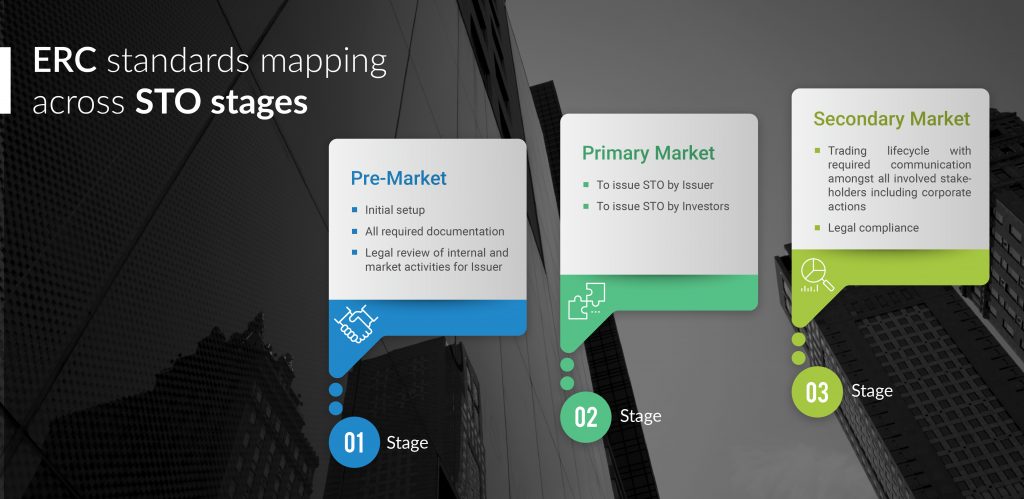Home » Why does it matter for a technology company like us to embrace global tech standards?
INSIGHTS
Intelligent solutions. Informed decisions. Unrivaled results.

Why does it matter for a technology company like us to embrace global tech standards?
When ERC-20 Standards came into existence, it eased down the ICO token interoperability across wallets & crypto exchanges for all ERC-20 compliant tokens. Having standards for any process not only helps to have bigger acceptance but also improves interoperability to build up an ecosystem. Being a technology obsessed firm, we’ve always encouraged standards to be in place. An acceptable standard not only helps developers (One of the strongest stakeholders in the ecosystem who have the responsibility to provide workable solutions by using available technology) to build the ecosystem but also leads to minimal changes for implementing interoperability. In today’s world, there is no system in existence which does not raise any error /failure in real time usage . Using global standards provides us another vital advantage of finding a resolution for such errors/failures as these cases would have already been resolved by the tech fraternity earlier.
Today, it is of utmost importance to have standards that can not only integrate multiple systems (STO Platforms, Wallets and Exchanges) with minimal changes but also make security tokens easily interoperable across wallets and exchanges. Security Token Offerings can’t be an exception for not having standards when they seem to have the biggest and most complicated technological advancement for transforming the existing world of security to Digitized security with automated processing over traditional blockchain technology.
The recent traction on ERC-1400 (now moved to ERC-1411) has helped towards defining standard libraries for the complete STO life cycle especially for on-chain/off-chain transactions This compilation of requirements has got the technology folks globally excited as this has the mettle to ease down the complete STO lifecycle. It completely makes sense that lots of individuals are very excited to see such a good compilation of requirements from various involved participants with probable interface that can ease down the complete STO lifecycle. Github, for instance has a lot of real time developers participating in discussions to share their experiences as well.
Ethereum Standards (ERC abbreviation of Ethereum Request for Comments) related to regulated tokens
The below standards are worth a read to understand in depth about the rationale behind targeting more regulated transactions based on Ethereum tokens –
- ERC-1404 : Simple Restricted Token Standard
- ERC-1462 : Base Security Token
- ERC-884 : Delaware General Corporations Law (DGCL) compatible share token
ConsenSys claims to have implemented ERC-1400 on the Github repository & named the solution as Dauriel Network. GitHub says, “Dauriel Network is an advanced institutional technology platform for issuing and exchanging tokenized financial assets, powered by the Ethereum blockchain.”
ERC-1400 (Renamed to ERC-1411) Overview
Smart contracts will eventually control all the activities like Security issuance process, trading lifecycle from an issuer & investor perspective as well as event processing related to security token automatically. Let’s try to understand ERC-1400 standard libraries with respect to each activity for STO lifecycle :
- ERC-20: Token Standards
- ERC-777: A New Advanced Token Standards
- ERC 1410: Partially Fungible Token Standard
- ERC 1594: Core Security Token Standard
- ERC-1643: Document Management Standard
- ERC-1644: Controller Token Operation Standard
- ERC-1066: Standard way to design Ethereum Status Code (ESC)
All the defined methods inside each standard (Solidity Smart Contract Interfaces) at an activity level are (Pre Market, Primary Market, Secondary Market) and can be represented pictorially as below:
It is of utmost importance to distinguish Off-Chain & On-Chain activities with those that will be processed outside STO platform before defining the mapping between standard libraries methods and activities across all 3 stages. Off Chain activities can be done outside the main chain of underlying blockchain platform then merged. However, Integration will be needed for all activities performed outside an STO platform where several standards (e.g. ERC-725 & ERC-735 define for Identity management) play an important role.
All activities related to Pre-Market are supposed to happen outside the STO platform as those are completely related to documentation like structuring the offering, preparing the required documentation with all internal and external stakeholders including the legal team to ensure regulation compliances . To bring reference of all pre market documentation to the STO platform, Cryptographic representation of all documentation can be used effectively.
Similarly, KYC/AML process can happen off-chain with proper integration on the STO platforms with proper identity management (standards around Identity management like ERC-725 and ERC-735).
ERC-1400 (now a.k.a ERC-1411) covers all activities related to primary and secondary market with proper integration to all off chain data which brings all related documentation/identity to the underlying blockchain platform on which the STO is designed.
Magic and its approach for defining ERC-1411 mapping
Team Magic is working continuously to define the mapping between all defined methods with all real time activities of primary and secondary markets. A key part of our strategy is to collect all requirements from various stakeholders like Security lawyers, Exchange Operators, KYA providers, Custodians, Business Owners, Regulators, Legal Advisor. Once we have all requirements collected then our experienced business analyst teams (Experts from Pricing, Corporate Actions, and Risk Assessment) take over and reconcile the requirements with ERC-1400 standards to not only map each requirement but also find out the gaps in the standards. Post this, our technology team prepares the implementation strategy of all those standards by developing smart contracts in Solidity. Having an in-house developed smart contract for any specific case study (Provided by our Business Analyst team) helps us define Auditing of ERC-1400 specific smart contracts and the testing strategy for each contract as well.
 Blockchain QA
Blockchain QA
Migrate, implement, test & support multiple enterprise blockchain solutions, efficiently.


